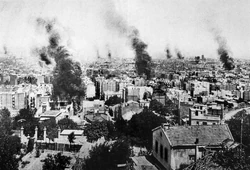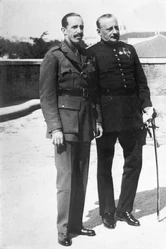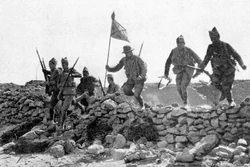- This article is designated a work in progress. Please ask the wiki team before adding content.
- The information in this article is part of an upcoming rework, and may not be reflected in other articles.
With an ongoing Spanish rework, this page contains information relating to both the current Spanish setup and in-progress rework, with the ultimate goal, of course, being to phase out all older information once the changes to Spain are introduced.
| Lore | Paths |
Spain (Spanish: España), officially the Kingdom of Spain, is a sovereign state largely located on the Iberian Peninsula in southwestern Europe, with archipelagos in the Atlantic Ocean and the Mediterranean Sea, as well as colonial possessions in Africa. The Spanish mainland is bordered to the South and East by the Mediterranean Sea; to the North and Northeast by the Commune of France, Andorra, and the Bay of Biscay; and to the West and Northwest by Portugal and the Atlantic Ocean. Along with the Commune of France, Spain is one of the only two countries to have both Atlantic and Mediterranean coastlines. Extending to 1,214 km (754 mi), the Portuguese-Spanish border is the longest uninterrupted border in Europe.
Spanish territory includes two archipleagos: the Balearic Isles in the Mediterranean Sea and the Canary Islands in the Atlantic Ocean. Spanish colonial possessions include: Spanish Guinea, the Spanish Sahara, and the Spanish protectorate in Morocco. Through these colonial possessions, Spain also shares a land border with the German Empire through Mittelafrika, and the French Republic
History[]
Entering the 20th Century[]
Three Carlist Wars, a failed Republic, controversial Restoration, and the loss of the last remnants of Spain’s colonial empire to the rising United States left the country to enter the 20th century in humiliation and profound socio-political division. Between 1874 and 1923, the Spanish political scene was dominated by a system known as Turnismo, by committing electoral fraud the Liberal and Conservative Parties would effectively share power, bowing out in favour of the other after a predetermined length of time - or if public opinion took a turn for the worst. On paper Spain was a parliamentary constitutional monarchy, in practice, things were not so simple. True opposition mostly came from the UGT (Unión General de Trabajadores); Spain's largest Trade Union, as well as from anarchist terrorism, with political assassinations commonplace in 20th century Spain. Aimed originally at inculcating popular democracy while keeping out radicals, Turnismo failed on both counts in the face of endemic corruption, cronyism, and national chauvinism. During the 1910s, Spain found itself trapped into a never-ending cycle of colonial revolts and local uprisings, in which the influence of socialist, anarchist, and nationalist parties grew exponentially in the face of declining faith in Spain’s government and especially her king, Alfonso XIII, who was ridiculed as an effete playboy with no interest in even the pretense of rule. Even the Carlists, despite meager electoral performances since their transition into politics after the Third Carlist War, began to pose a tangible if disjointed threat.

Barcelona in flames during the Semana Trágica of 1909; A well-fitting metaphore for Spain in the late 19th and early 20th century
The Rif War (1920-1923)[]
- Main article: Rif War
The Rif War was a conflict fought between the Kingdom of Spain and the Republic of the Rif - a Berber Republic established by Abd el-Krim in the Spanish Moroccan Protectorate. An initial Spanish expedition led by High Commissioner for Morocco Dámaso Berenguer Fusté was to end in disaster with el-Krim's forces inflicting a series of crushing military defeats on the numerically and technologically superior Spanish Force. Over 3 years of continuous military defeats were to make the Rif War nothing short of a national embarrassment, an embarrassment which would not only bring down the sitting government but the entire Spanish democratic process. The straw that broke the camel's back fell not in Spain, but Morocco during July-August, 1921. Poorly-led, poorly-equipped, and divided both geographically and politically, the Spanish army was annihilated at the Battle of Annual by the Rif rebels under Abd el-Krim. The response in Spain was immediate, with riots breaking out in the streets and parliament alike, once again demanding an investigation not only into the Spanish government and army’s conduct, but also for King Alfonso himself, who was said to have replied that “chicken meat is cheap” when informed of the battle’s outcome, before returning to a game of golf.
Enter Rivera (1923)[]

"The Dictator and his King": Miguel Primo de Rivera and King Alfonso XIII
With the political chaos caused by the defeat, the UGT starred one of the more memorable acts of political violence was the assassination of Prime Minister Eduardo Dato e Iradier. Whilst being driven from the Parliament building at the height of the Rif War, Dato was shot dead by 3 Catalan anarchists - Lluís Nicolau, Pere Mateu, and Ramon Casanelles - travelling by motorcycle, in one of the world's first modern 'Drive-by shootings''.
The events following Dato's assassination led to the establishment of a new Liberal Government headed by former Prime Minister Manuel García-Prieto. The new government quickly alienated military circles by refusing to commit further resources and spending to the Rif War in the fact of constant defeats at the hands of el-Krim's forces. This alienation and discontent was to culminate in a coup d'état led by General Miguel Primo de Rivera, taking full advantage of military opposition to García-Prieto's administration.
On 13th September 1923 Rivera marched on Madrid, swaying the local garrison to his cause, quickly taking control of the city. A manifesto was quickly issued to the people of Spain; proclaiming that a '...brief parenthesis had to be opened in the constitution life of the Kingdom "... so as to restore order and wash away the old system of Turnismo".' Alfonso XIII, resentful of attacks on his person from the Liberal Party and other Republicans in the Cortes, was quick to name Rivera as Prime Minister, declaring his support for a new Spanish regime - the King and his council were in fact well aware of Rivera's plans in advance of his coup attempt, simply allowing the General to proceed with his rising. Martial law was immediately invoked, the Cortes disbanded, and a Supreme Directory headed by Rivera established to govern the country. The Spanish bureaucracy was systemically purged, with hostile civil servants replaced with loyal officers and sympathetic businessmen. Despite personally showing no interest in continuing the Rif War, the General quickly announced further mobilisation of reserve forces and authorised the use of chemical weaponry in order to bring an end to the conflict and to appease the increasingly influential Africanist officers.
In the meantime, though Spain had been developing greater economic ties with Germany for years in the wake of the Weltkrieg, Rivera threw Spain wholeheartedly into Germany’s embrace. German capital and goods poured into Spain, financing an industrial and banking boom that lurched Spain’s economy back on track. This was paired with an unprecedented period of peace with labour, as Spain’s trade unions, the UGT chief among them, cautiously cooperated with the ostensibly “apolitical” Rivera. German support proved equally useful militarily, as Spain not only earned insurance from the Communard threat across the Pyrenees, but German forces in Morocco proved instrumental in helping Spain end the Rif War
Conquest of Gibraltar (1925)[]
The syndicalist uprising in Britain from late 1924 inspired the declaration of the Commune of Gibraltar in January by striking members of the working class. Soldiers ordered to suppress the strike followed the example of some in Great Britain and mutinied, storming the governors' residence and securing revolutionary control over the rock. A violent purge of crown loyalists followed.
On January 25, Spanish military forces attacked Gibraltar a bid to 'pacify rebellious elements' and restore stability. With the British Empire behind it, the Rock had been thought almost impregnible. However, the new Commune's military leadership was inexperienced and could not count on resupply by sea. Spain was willing to take heavy casualties in its assaults and the initial gains, while modest even compared to Gibraltar's small size, alarmed the garrison and quickly sapped morale. By the start of February resistance had ceased and martial law was declared with a new Spanish military governor installed. Spanish Prime Minister, Miguel Primo de Rivera, propagandised the takeover as a glorious victory against syndicalism and the recovery of the long lost territory of Gibraltar but remained vague on long-term plans for the area. Risso and Liaño would be arrested by the Spanish military authorities and held in custody in mainland Spain though both later escape and fled to France.

Spanish scout plane flying over Gibraltar
Many British governors, fearing their own mutinies and suffering a similar fate to Governor Sir Charles Monro invited foreign governments (primarily the German Empire) into their territory to maintain security and stability.
The End of the Rif War (1925-1927)[]

Spanish troops in Morocco, 1924
Despite reinforcing the Army of Africa, Rivera like his predecessors was unable to bring a swift end to the Rif War; with el-Krim's guerrillas seemingly unable to be pinned down by the slowly advancing Spanish Forces. Respite was to finally arrive in the form of a German intervention beginning in April 1925. On 12th April approximately 8,000 Rifians launched a major raid on a German outpost North of the border, with the unprepared German garrison suffering heavy casualties in the face of the Rifian surprise attack. Accordingly, the German Empire intervened on the Spanish side of the conflict, deploying over 100,000 men from both German Morocco and Continental Germany, leaving the Rifians hopelessly outnumbered. After one last year of fighting the Rifian forces were finally routed on 8th May 1927 by a combined Spanish-German force under the command of General José Sanjurjo Sacanell.
Decline of the Rivera Government (1928-1936)[]
Though Rivera’s early years exceeded all expectation, his regime could only buy popularity with prosperity and military victories for so long. Rivera’s attempt to create a national, non-political party and corporatist government under the Unión Patriótica failed to not only reconcile the centre and left, but even the right was not swayed by its cynical pandering. Indeed, the strength of the Rivera regime had emboldened the Alfonsists to expand persecution of Carlist politicians and sympathizers to the point that even the pretender, Don Jaime, abandoned his conciliatory stance.
The end of the 1920s and early 1930s initiated what many see as Rivera’s terminal decline. The normalization from Spain’s earlier boom was severely hampered by economic troubles in the Reichspakt and United States, who had become Spain’s key trade partners in the wake of Britain and France’s fall to Syndicalism. The visibly declining peseta once again brought crowds to the streets, urged on by not only the CNT and UGT but much of the centre and even the Carlists.
As 1936 dawns, an ailing Rivera clings to power on the back of the handful of genuine Alfonsists and Spain’s bureaucracy. Neither the army nor the Church has been won over by Rivera’s politicking, and many in both organizations harbour strong sympathies with the Carlists, who many have come to see as the legitimate force on the right both dynastically and politically. Rising discontent has revitalized the radicals and centre-left, while the anarcho-syndicalists in Catalonia gather French weapons and await the coming revolution.
Politics[]
| Conscription Law: Limited Conscription |
| Economic Law: Civilian Economy |
| Trade Law: Export Focus |
| Head of Government: Miguel Primo de Rivera y Orbaneja |
| Foreign Minister: Julio López Oliván |
| Economy Minister: José Calvo Sotelo |
| Security Minister: Severiano Martínez Anido |
| Intelligence Minister: Pedro Bazán Esteban |
Military[]
Army[]
The Spanish Armed Forces currently consist of 13,000 active personnel spread across: 2 Regional HQ Divisions, 17 Infantry Divisions, 1 Mountain Division, 2 Cavalry Divisions, 2 Regional Garrisons, and 2 Colonial Light Infantry Divisions. General Manuel Goded Llopis is the current Chief of the General Staff with José Enrique Varela serving as his loyal deputy. While relatively modern by international standards, the Spanish armed forces await much-needed reform, with the most modern equipment and units currently serving as part of the Army of Africa and the Spanish Legion.
[]
The Spanish Navy is comprised of 2 España Class Battleships, 2 Canarias Class Heavy Cruisers, 6 Light Cruisers of varying ages, 17 Destroyers, and 12 Submarines. Despite being fairly large in size the Spanish fleet is woefully outdated with the 2 German designed Canarias Class Heavy Cruisers far outperforming the dated España Class Battleships. Admiral Antonio Magaz y Pers is the current Minister of the Navy.
Airforce[]
The Spanish Airforce is comprised of 214 aircraft spread between 2 Fight Wings, 1 Interceptor Wing, a Tactical Bombing Wing, and a dedicated Naval Bomber Wing. Largely neglected by the General Staff, the Spanish Airforce is generally seen as nothing more than an accessory to the equally underfunded Navy. Procurement of new aircraft and general aerial affairs are handled by Major Juan Antonio Ansaldo Vejarano, a close ally of General Sanjurjo.
Foreign Relations[]
Spain is a member of Mitteleuropa, with the German Empire assenting to Spain's annexation of Gibraltar during the fall of the British Empire. however, this would come at the cost of alienating the Entente. Spanish troops have occupied the small country of Andorra since the end of the French Revolution, to provide security against any Communard incursion.
Unfriendly relations with the Commune of France, the Socialist Republic of Italy, the Union of Britain, and Morocco.
Economy[]
Though Spain had been developing greater economic ties with Germany for years in the wake of the Weltkrieg, Rivera threw Spain wholeheartedly into Germany’s embrace. German capital and goods poured into Spain, financing an industrial and banking boom that lurched Spain’s economy slowly back on track.
The normalization from Spain’s earlier boom was severely hampered by economic troubles in the Reichspakt and United States, who had become Spain’s key trade partners in the wake of Britain and France’s fall to Syndicalism.
Culture[]
Languages[]
Spanish (español), or Castillian (castellano), is the Kingdom of Spain's sole legally recognised language. Other regional languages, such as Catalan (català), Valencian (valencià), Galician (galego), and Basque (euskara), whilst widespeard, are actively suppressed by state authorities.
